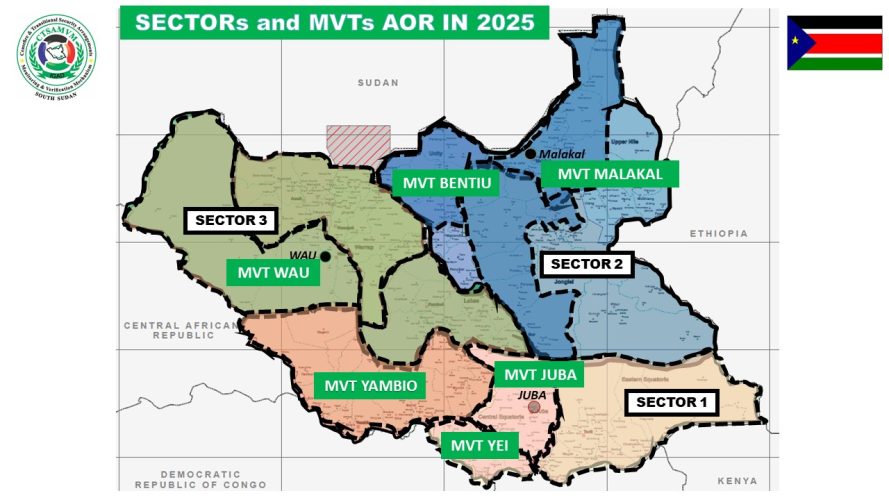Our Operations

CTSAMVM’s Monitoring and Verification Teams (MVTs) monitor compliance by the Parties and armed groups, either under their control or invited to support them, to the Permanent Ceasefire and Transitional Security Arrangements.
The MVTs patrol their areas of responsibility and gather information on potential violations, which they immediately report to the CTSAMVM Headquarters in Juba.
Potential violations can include reports of military fighting, movements of forces, blockage of aid routes, forced recruitment of child soldiers, and attacks on civilians, as well as inciting propaganda, movement of troops, and other activities prohibited by the Agreement on Cessation of Hostilities (ACoH 2017).
CTSAMVM can initiate investigations based on its own findings. Allegations of violations can also be submitted to the CTSAMVM by the Parties, by members of the public and communities, or by third parties such as non-governmental and multilateral organizations.
Upon receipt of an allegation, the CTSAMVM Chairperson initiates a preliminary investigation and may task an MVT with carrying out further inquiries. This can include site visits and interviews with military forces, civil authorities, members of the public, and humanitarian organizations. The MVT is entitled to visit any location and speak to anyone without hindrance.
Once an investigation is completed, the MVT compiles an investigation report, which is sent to CTSAMVM Headquarters. Headquarters staff, including investigative and legal experts, then compile a violation report for the Chairperson, who determines whether the report is forwarded to CTSAMVM’s Technical Committee and CTSAMVM’s Board for further discussion.
The CTSAMVM Board, which includes members of the Signatory Parties, the international community, and non-political South Sudanese stakeholders, reviews the report’s findings and recommendations. Party members can be asked what action they are taking to avoid further conflict. The CTSAMVM Chairperson also sends the reports to RJMEC and the IGAD Council of Ministers. RJMEC then publishes the reports.
https://simitra.bpsdmd.jatengprov.go.id/
https://daftar.bpsdmd.jatengprov.go.id/user/
4 jenis fitur untuk memaksimalkan kemenangan slot
admin slot bocorin pola slot mahasiswa raih cuan ratusan juta
agus main di pg soft langsung menang dan masuk rekening agus
aksi brutal serasa dihantam scatter hitam
berhasil tangkap scatter online diiringi sunset di pantai bali
bmw terjun dari ujung tol di gresin akibat asik main judi online
cara ampuh atasin badan demam dan meriang
driver ojol bawa pulang pajero dari hadiah tebak angka
gak perlu takut kalah rekomendasi permainan slot anti boncos
geger wna naik kereta batu bara kai investigasi scatter hitam
ibu 2 sangat anak terkejut dengan kemenangan besar di slot 88
ini rahasia menang slot dalam waktu 5 menit
inilah penyebab dan cara mengatasinya dengan maxwin x 500
iseng main slot sambil rebahan malah jackpot
kisah megatron red sparks dari lapangan ke dunia slot
lg investasi jumbo ke slot online scatter hitam
mahasiswa raih 120 juta dengan modal 10 ribu
main slot 777 cuan vibes maksimal jacpot fakta
manager esport kepergok main slot saat turnamen
manager tim esport asyik main slot mahjong saat live
mikel dari sma negeri 1 jakarta menang judi bola sbo mix parlay karena 5 strategi
netizen serasas lihat naga scatter hitam
netizen syok lihat patung kura kura seharga hadiah jackpot
ngopi di teras sambil main slot berhasil temu pola jackpot
pemain muda tembus jackpot usai coba trik gacor
pemuda beruntung membagikan kisah mendapatkan scatter hitam
penjaga toko sembako tembut jackpot slot rp 312 juta
penulis buku finansial legendaris slot gacor rich dad poor dad kembali
rahasia mawin modal 10 ribu hari ini
rahasia maxwin slotter dengan fitur live rtp
reaksi bocah nemu duit ratusan rupiah seperti menang mesin lotre
saatnya bangkit dan spin dengan gaya main 500
scatter hitam pecah rekor member rauh jutaan rupiah
seorang kakek berhasil memenangkan slot gacor saat menggembala domba
slot gacor itu nyata petani hasilkan 250 juta
slot gampang menang terbukti bocah 18 tahun klaim jackpot
tips bermain togel pasti tembus dengan prediksi jitu
tips dapatkan pecahan 100 juta dengan modal 10 ribu
viral anak kos beli iphone dari modal tebak angka
https://stkip-pb.ac.id/backup/tukang-potong-rumput-temukan-rahasia-scatter-hitam.html
https://stkip-pb.ac.id/backup/pola-rtp-akurat-ikuti-panduan-admin-langkah-demi-langkah.html
https://stkip-pb.ac.id/backup/putaran-terakhir-mahjong-ways-berujung-kemenangan-manis.html
https://stkip-pb.ac.id/backup/pemandu-wisata-borobudur-menguasai-pola-jackpot-mahjong-ways.html
https://stkip-pb.ac.id/backup/tips-dan-trik-cara-mendapatkan-emas-antam-melalui-scatter-hitam.html
https://stkip-pb.ac.id/backup/investasi-terbaik-dengan-mengikuti-pola-rtp-mahjong-ways-2.html
https://stkip-pb.ac.id/backup/profit-ratusan-juta!-ini-dia-ulasannya-tentang-scatter-hitam.html
https://stkip-pb.ac.id/backup/ikuti-panduan-bandar-untuk-menguasai-mahjong-ways.html
https://stkip-pb.ac.id/backup/pahami-pola-rtp-dengan-benar-agar-profit-maksimal-setiap-hari.html
https://ejournal.nurulqadim.ac.id/public/journals/2/bocoran-kode-bug-rahasia-situs-mahjong-ways.html
RTP Beberapa Game Mendadak Naik Banyak Pemain Langsung CekPG Soft & Pragmatic Lagi Di Puncak Tren, Pemain Bahas di Mana-Mana
Pemain Ramai Bahas RTP PG Soft & Pragmatic yang Katanya Lagi Bagus Hari Ini
Ramai Dibahas! Banyak Pemain Temukan “Jam Bagus” untuk Mahjong Ways 3
Banyak Pemain Temukan “Momentum Ringan” di Mahjong Ways 3 Pagi Ini
Perubahan Kerasa Banget! Banyak Pemain Laporkan Free Spin Lebih Mudah
Fenomena Baru! Simbol Emas di Mahjong Ways 3 Terasa Lebih Sering Muncul
RTP SLOT
PG Soft
PG SOFT
PG SOFT
RTP SLOT
RTP SLOT
MAHJONG WAYS
MAHJONG WAYS
MAHJONG WAYS
MAHJONG WAYS
MAHJONG WAYS
MAHJONG WAYS
https://yesheesportsevents.com/
https://srinivasaagroseeds.com/
https://afslanken-zonderdieet.nl/
https://blaasontstekingsymptomen.nl/
https://dyslexie-tipsentrucs.nl/
https://elektrischeeeltverwijderaar.nl/
https://pafikota-surabaya.org/
https://poltekkesgorontalo.id/
https://poltekkespontianak.id/
https://ejournal.poltekkeskendari.id/
https://ejournal.poltekkesgorontalo.id/
https://ejournal.poltekkespontianak.id/
https://ejournal.poltekkesdenpasar.id/
https://ejournal.bali-travel-online.com/
https://snelenvoordeligweg.nl/
https://quickcelebfacts.com/about-us
https://www.getfound.id/ui-ux-service/
https://abecs.org.br/quem-somos
https://www.aurangabadhotels.org/
https://www.mumbaibombay-hotels.com/
https://www.bucharest-hotel-guide.com/
https://www.1001restaurants.com/
https://pafikotalangsa.org/registrasi.html
